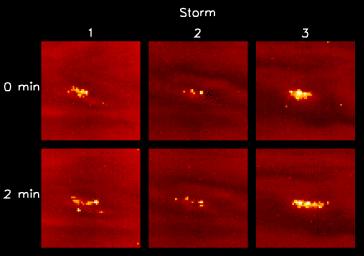
|
Changing Lightning Storms on Jupiter
- Click the image above for a larger view
- Full-Res JPEG (880 x 620) (37.3 kB)
- Full-Res TIFF (880 x 620) (85.0 kB)
Caption:
This view shows lightning storms in three different locations (panels 1, 2, and 3) on Jupiter's night side. Each panel shows multiple lightning strikes, coming from different parts of the same storm. The lightning originates in Jupiter's water cloud, which is 50 to 75 kilometers (30 to 45 miles) below the ammonia cloud. The latter acts as a translucent screen, diffusing the light over an area comparable to the depth. The individual strikes are unresolved in these images, which have a resolution of 133 kilometers (80 miles) per picture element.
The brightest strikes emit as much light energy as 30 million 100-watt light bulbs burning for one second, which makes the strikes hundreds of times brighter than lightning on Earth. The bottom row shows the same three storms as the top row but the bottom-row images were taken two minutes later. The images were taken in the clear filter with an exposure time of 90 seconds. Clouds, illuminated by light reflected off Jupiter's moon Io, can be seen in the background. Moonlight on Jupiter is 100,000 times fainter than sunlight, and the lightning flashes would be undetectable on the day side of the planet.
North is at the top of the picture. The planetocentric latitudes and west longitudes (in degrees) of the storms in panels 1 through 3 are (34.4, 16.1), (23.4, 27.6), and (8.6, 15.6), respectively. The panels are 8,000 kilometers (5,000 miles) on a side. The images in the top row were taken on October 6, 1997 at Universal Times (in hours:minutes:seconds), of 00:15:01, 00:17:03, and 00:17:03, respectively, by the solid state imaging camera system onboard NASA's Galileo spacecraft. Distance from the planet to the spacecraft was 6.62 million kilometers (4.1 million miles).
Background Info:
JPL manages the Galileo mission for NASA's Office of Space Science, Washington, DC.
This image and other images and data received from Galileo are posted on the World Wide Web, on the Galileo mission home page at http://galileo.jpl.nasa.gov . Background information and educational context for the images can be found at http://www.jpl.nasa.gov/galileo/sepo .
Cataloging Keywords:
| Name | Value | Additional Values |
|---|---|---|
| Target | Jupiter | Io |
| System | Jupiter | |
| Target Type | Planet | Satellite |
| Mission | Galileo | |
| Instrument Host | Galileo Orbiter | |
| Host Type | Orbiter | |
| Instrument | Solid-State Imaging (SSI) | |
| Detector | ||
| Extra Keywords | Ammonia, Atmosphere, Color, Moon, Storm, Water | |
| Acquisition Date | ||
| Release Date | 1998-10-13 | |
| Date in Caption | 1997-10-06 | |
| Image Credit | NASA/JPL-Caltech | |
| Source | photojournal.jpl.nasa.gov/catalog/PIA01636 | |
| Identifier | PIA01636 | |
